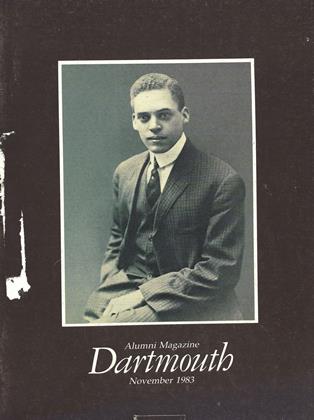Among those papers dating from my student days in Hanover are several items which, though I haven't seen for many years, I know still exist somewhere. One of them is a gray, thinlined notebook crammed with mundane facts from Prof. Lathrop's art history survey, and there's another from Phil 25, outlining the late Prof. Gramlich's lecture on "The Philosophy of Human Nature." Both courses made an impact on me that has endured long past finals. In the box with those note-books are also some newspaper clip-pings, now long-since yellowed a picture of my father and me taken Freshman Father's Weekend and sent off by Campion's to my hometown newspaper; Allison Danzig's splendid account of the Dartmouth-Princeton game during the fall of my senior year when both elevens went in to the season finale unbeaten and untied (Dart mouth won the game and the Lambert Trophy, with Princeton coming in second in the Ivies and No. 2 in the Lambert, surely the last time that will ever happen); and the Extra printed by TheDartmouth November 22, 1963, the only one I can remember them printing.
The fall of '63 was a memorable one in Hanover. The football team carried over its winning streak from the undefeated '62 season with back-to-back victories over Bucknell, Penn, Brown, and Holy Cross before finally succumbing to Harvard and Yale. Front-page
spreads in September's Dartmouth noted that Psych 1 had been the most popular course the preceding year, and that the Alumni Fund had set a new record with more than $1.4 million in the coffers and another record-breaking 67 percent participation. It was, in short, life as usual at Dartmouth.
There were notable figures on campus that autumn. Alexander Bickel and Henry Steele Commager addressed the seniors in Great Issues. Nelson Rocke feller unofficially kicked off his campaign for the presidential nomination one beautiful Saturday on the front steps of Tanzi's, and Alabama governor George Wallace made an appearance in Leverone, in spite of picketers and widespread protest. Racial tension was, unfortunately, much in evidence the whole semester, exacerbated by a couple of ugly incidents occurring on Fraternity Row during rush.
Passions subsided somewhat as the semester stretched toward Thanksgiving. But we were totally unprepared for the word that came put of Dallas when we learned that John F. Kennedy had been shot. It was unthinkable. All of us had heard our elders speak of Pearl Harbor and shake their heads and recite exactly where they were and what they were doing when they had heard about the Japanese attack on Pearl early Sunday morning on December 7th. It was for many of them a watershed, a kind of stop-time before and after which life was different; as of the afternoon of Friday November 22nd, we had an appalling parallel.
Things which only moments before had seemed so important finishing a paper on Christopher Marlowe due Saturday at 10:00 a.m., getting to the bank before it closed simply vanished into a blur of triviality. I remember reading and rereading the Extra, its black, haunting headline, scrutinizing the words below for meaning only to find a jumble of squiggles on the page. It made no more sense to me then, sitting in dazed bewilderment, listening to the radio and talking to my best friend in 3 Topliff Hall, than it does today. And twenty years later, it is sad to reflect that what was once unthinkable has become not commonplace, but not all that surprising.
 View Full Issue
View Full Issue
More From This Issue
-
 Feature
Feature"The Greatest Problem in American Biology
November 1983 -
 Feature
FeatureGiving the Rush to the Record books
November 1983 By Brad Hills '65 -
 Feature
FeatureJohn Singer Sargent: Last of the Great Portrait Painters
November 1983 By Richard Stuart Teitz -
 Sports
SportsSports
November 1983 By Kathy Slattery -
 Books
BooksAll Biology Is Indebted . . .
November 1983 By Peter Smith -
 Class Notes
Class Notes1979
November 1983 By Burr Gray
Douglas Greenwood
-
 Lettter from the Editor
Lettter from the EditorOn Being No. 1
MARCH 1984 By Douglas Greenwood -
 Lettter from the Editor
Lettter from the EditorRuffly Speaking
NOVEMBER 1984 By Douglas Greenwood -
 Lettter from the Editor
Lettter from the EditorSome Thoughts on Commencement, 1985
June • 1985 By Douglas Greenwood -
 Lettter from the Editor
Lettter from the EditorThe Place of Art
SEPTEMBER 1985 By Douglas Greenwood -
 Lettter from the Editor
Lettter from the EditorYou Can't Go Home, etc.
OCTOBER 1985 By Douglas Greenwood -
 Article
ArticleThe winter of our discontent
APRIL 1986 By Douglas Greenwood
Lettter from the Editor
-
 Lettter from the Editor
Lettter from the EditorEditorial Comment
November 1928 -
 Lettter from the Editor
Lettter from the EditorPresident Hopkins' Tribute
May 1937 -
 Lettter from the Editor
Lettter from the EditorSeptember
SEPTEMBER 1984 -
 Lettter from the Editor
Lettter from the EditorSettling in in Hanover
JUNE 1983 By Douglas Greenwood -
 Lettter from the Editor
Lettter from the Editor75 and Counting
OCTOBER, 1908 By Douglas Greenwood -
 Lettter from the Editor
Lettter from the EditorThe Place of Art
SEPTEMBER 1985 By Douglas Greenwood

